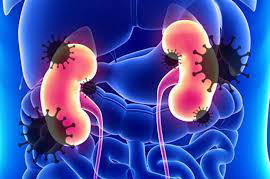Study Finds That COVID-19 Induced Acute Kidney Injury Similar To Sepsis-Caused Kidney Injury And That Mitochondrial Dysfunction May Play A Key Role
Source: COVID-19 Induced Acute Kidney Injury Jul 21, 2021 4 years, 5 months, 1 week, 3 days, 9 hours, 59 minutes ago
A new study by researchers from Mayo Clinic has found that acute kidney injury often found in most hospitalized COVID-19 patients are similar to that of sepsis-caused kidney injury and that the immune response triggered by the infection plays a pivotal role. The study findings also suggest that that mitochondrial dysfunction ie a loss of function in cellular energy production is commonly found in kidney injury related to COVID-19.

The study findings were published in the peer reviewed journal: Mayo Clinic Proceedings.
https://www.sciencedirect.com/science/article/pii/S0025619621005103
To date, it has been found that more than one-third of hospitalized SARS-CoV-2 infected patients report
COVID-19 induced acute kidney injury, and sudden kidney failure is a risk factor for in-hospital mortality.
Dr Mariam Alexander, M.D., a renal pathologist at Mayo Clinic and the study's lead author told Thailand Medical News, "These occurrences suggest that COVID-19 can induce a robust immune response in patients that contributes to the kidney injury, and kidney-supportive treatments should be initiated early for these patients."
She further added, "Our study data point to mitochondrial injury as a potential target for therapies, some of which recently have been developed and tested in preclinical models."
The severe form of the COVID-19 disease is known to be associated with a systemic inflammatory response, as well as inflammation in the heart and lungs.
However little research is available about immune response in the kidneys, and molecular studies on the renal pathology of COVID-19 patients have been limited.
Dr Alexander added, "To our knowledge, this is the first in-depth study investigating the molecular and cellular changes seen in COVID-19-related kidney injury."
The study team evaluated the kidneys of 17 adults who died from COVID-19 and had an autopsy performed at Mayo Clinic between April 2020 and October 2020.
In a subset of 7 COVID-19 cases with post-mortem interval of ≤20 hours, ultrastructural and molecular characteristics (targeted transcriptome & proteomics analyses of tubulointerstitium) were evaluated. Molecular characteristics were compared to archived cases of S-AKI and non-sepsis causes of AKI (NS-AKI).
The spectrum of COVID-19 renal pathology included macrophage dominant microvascular inflammation (glomerulitis and peritubular capillaritis), vascular dysfunction (peritubular capillary congestion & endothelial injury), tubular injury with ultrastructural evidence of mitochondrial damage.
Detailed investigation of the spatial architecture using a novel imaging mass cytometry revealed enrichment of CD3+CD4+ T cells in close proximity to antigen-presenting cells, and macrophage-enriched glomerular and interstitial infiltrates, suggesting an innate and adaptive immune tissue response. COVID-19 AKI and S-AKI, as compared to NS-AKI, had an enrichment of transcriptional pathways involved in inflammation (apoptosis, autophagy, MHC class I and II, a
nd Th1 differentiation).
Proteomic pathway analysis demonstrated that COVID-19 AKI & to a lesser extent S-AKI was enriched in necroptosis and sirtuin signaling pathways, both involved in regulatory response to inflammation. Upregulation of ceramide signaling pathway and downregulation of oxidative phosphorylation in COVID-19 AKI was noted.
The team described the pathological spectrum of the kidney injury related to COVID-19 and characterized its molecular profile, compared with sepsis-associated injury.
The study findings showed that the morphological and molecular profile of severe COVID-19 renal injury resembles sepsis renal injury, including microvascular dysfunction, inflammation and metabolic reprogramming.
Dr Alexander says. "The acute kidney injury seen in COVID-19 is likely secondary to activation of the immune system, similar to what is observed in patients with sepsis. COVID-19 kidneys are inflamed and show an increased rate of cell death and notably more mitochondrial injury, compared to kidneys with injury not related to COVID-19."
The mitochondria are cell structures that generate much of the chemical energy needed for proper cell function.
According to data published in the Journal of the American Society of Nephrology, of COVID-19 patients admitted to hospital ICUs, 76% have acute kidney injury. Hospitalized COVID-19 patients with secondary acute kidney injury have a nearly 50% risk of death, compared with 8% among those without kidney injury.
Of all the 17 patients in the Mayo Clinic study, the median age was 78 years, and 15 were male. Most had been hospitalized more than five days before death, and 53% reported hypertension as a comorbidity. Other leading comorbidities included diabetes and cardiovascular disease.
Dr Timucin Taner, M.D., Ph.D., a Mayo Clinic transplant surgeon, immunologist and senior author added, "The complex integrated imaging and molecular tests used in this study pave the way to perform similar molecular analyses in different disease conditions to study immune-mediated renal injuries in both native and transplant settings. We currently have several projects using this approach, with the goal being to identify the underlying mechanisms of different diseases, so we can help physicians treat these conditions more effectively."
For more about
COVID-19 Induced Acute Kidney Injury, keep on logging to Thailand Medical News.
